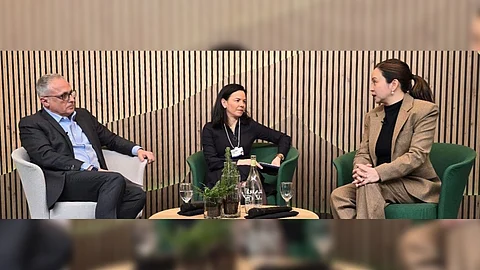
- NEWS
- the EDIT
- COMMENTARY
- BUSINESS
- LIFE
- SHOW
- ACTION
- GLOBAL GOALS
- SNAPS
- DYARYO TIRADA
- MORE

Fintech and emerging technologies such as artificial intelligence (AI) play a huge role in creating value for countries like the Philippines, finance superapp GCash recently highlighted at the recent World Economic Forum (WEF) annual meeting 2025 in Davos, Switzerland.
GCash president and CEO Martha Sazon, in a session entitled, “Leaving Asia’s Comfort Zone,” explored the potential of emerging technologies in driving economic growth.
She highlighted how GCash has been working toward increased financial inclusion, in collaboration with the Philippine government and other industry partners.
“GCash has worked toward using tech, data, and customer-centricity to address societal issues,” stressed Sazon, highlighting the goal of GCash in ensuring the benefits of harnessed technologies can be felt by all. “At the heart of what we do is financial inclusion.”
She underscored that true innovation creates societal impact — especially for those historically excluded by traditional banking services.
“Before the pandemic, the Philippines was highly unbanked, where only 29 percent of the population were banked,” Sazon said.
“Because of the adoption of fintech in the Philippines, the banked rate has now gone up to 65 percent. And the rate of those with financial access is even higher.”
This prompted the introduction of the first-ever eKYC (electronic Know Your Customer) process in the Philippines, followed by simplified cashless payments.
Today, GCash has over 94 million users, with access to loans, investments, and insurance at the tap of a phone screen.
This was echoed by GCash chief strategy officer Rowena Zamora, in a panel hosted by Deloitte.
“In an economy like the Philippines, where the majority of the population is unable to provide what traditional financial institutions need for them to open an account, the challenge is providing financial services to the largely unbanked or underbanked population,” Zamora said.
“We’re driven by a vision that’s very simple but very difficult to achieve, which is ‘Finance for All’,” Zamora said.
“The Philippines is underpenetrated in terms of financial services. It’s a country that faces many systemic challenges to inclusion, particularly financial inclusion, so GCash has focused on using technology, AI and other similar enablers to bridge that gap.”
The WEF Annual Meeting 2025 also placed the spotlight on AI, with leaders from governments and businesses around the world discussing at length the potential of the technology.
“A big part that AI can provide is personalization, which helps us tailor-fit solutions to address the issues we see in each segment. In the same way, AI can help us further earn the trust of our customers and keep our platform secure. We’ve been working with other global institutions to advance AI — not just for our customers but even internally,” Sazon said.
